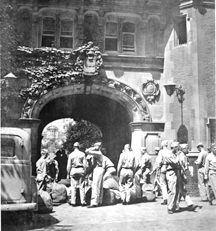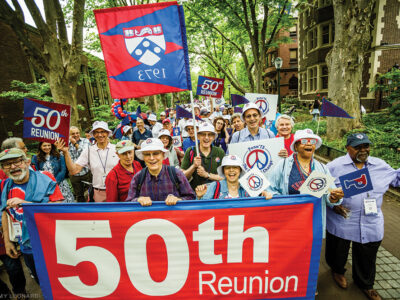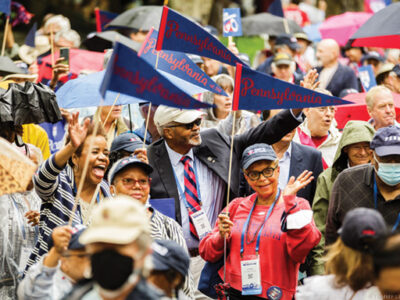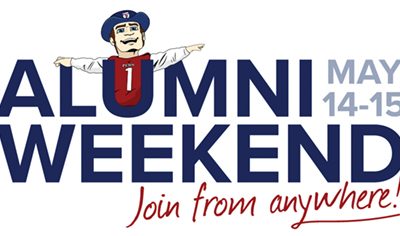
Seymour Finkelstein’s life as a University student changed forever one February morning in 1943. The Wharton School junior ate breakfast, then marched from the University campus to 30th Street Station with a couple hundred students, singing Penn songs along the way. Once there, Finkelstein W’46 boarded a train, and went on to serve during World War II as a navigator and bombardier in the U.S. Army Air Corps.
It would be nearly three years until he returned to campus. The first order of business, he recalls, was a haircut. (The barber embraced him.) He then visited his fraternity house—a reunion dampened by the deaths of five brothers in wartime service. After that, it was on to the task of finishing his degree through an accelerated program the University was offering veterans.
“Most of us had been very carefree, thought nothing was more important than having a good time,” he says. “Now we were more sober citizens. Our youth sort of went away.” Finkelstein graduated with 600 others in February 1946. “I knew probably three people in that class.”
Like Finkelstein, all Penn alumni who attended school at that time were affected in some way by “war-years syndrome.” Despite their affinity for the University, many feel little connection to the classes in which they graduated; turnout for individual class reunions tended to be low.
To try to change this, Penn is holding its first-ever War Years Reunion for the Classes of 1942 to 1949 during Alumni Weekend. The May 19 event will feature a cocktail reception, dinner and a speaker (possibilities include news anchor and The Greatest Generation author Tom Brokaw Hon’96, 60 Minutes commentator Andy Rooney and historian Stephen Ambrose).
Rebecca Sloviter, an assistant director in the Office of Alumni Relations, says the Reunion is the first one of this magnitude to be held by an Ivy League school. “This is not just an event to honor veterans,” she says. “We think there is a real unifying spirit to all of these alumni; whether they are veterans or not, they were all obviously affected by the war.”
The idea originated three years ago when Finkelstein, a retired businessman, organized a small brunch for wartime alumni before the Penn-Columbia football game in New York. Last spring, he and Harold Buxbaum W’45, of New Haven, Conn., contacted Sloviter about planning another brunch. She met with them, as well as Richard Kaskey W’43 and several others, over the summer and, at Buxbaum’s suggestion, the concept evolved into one of a full-scale reunion. A committee of 19 men and women representing all eight of those graduating classes is now working out the details.
Buxbaum, who owns an executive-recruiting firm in New Haven, recalls returning to two pleasant surprises at Penn after the war ended: All of a sudden, there were “girls” in his classes. And the greek system which had separated Christian and Jewish students into different fraternity and sorority houses had been officially abandoned.
But like Finkelstein, Buxbaum noticed the atmosphere had changed from one of fun and pranks to seriousness. “You totally lost your class unity.” (He chose to keep his original class designation of 1945, though he graduated in 1947; others did the opposite.)
He hopes the Reunion will result in “a reconnect to the University” for alumni who have skipped previous events, thinking they wouldn’t know anyone. “I think the school has earned our loyalty for what it did for us not only in education but keeping its promise to get us back in school [after the war] as soon as possible,” he says. “It will be fun getting back on campus and rekindling old ties.”
Records indicate there are about 8,000 living alumni in these classes, most of whom live in the Northeast. “I’m hoping and anticipating about 500 to 600 people will attend,” Sloviter says. “I think it’s realistic because of the passion and desire the alumni who are working on this have for it.”
“I have high hopes for it, just like many of the others do,” says John Lawler Jr. EE’43, a planning-committee member who lives in Philadelphia. One of the next steps, he says, is to start contacting classmates and he suspects the committee will divide up that task soon. “We’d prefer to have people calling people they know rather than doing a cold canvass.”
“We encourage all alumni from 1942 to 1949 to attend this Reunion,” Sloviter says. “If you haven’t been back since graduation or if you come back every year, this is a reunion that you can’t miss. We are really striving to make it all-inclusive.”
Finkelstein predicts the event will carry some “shock value” for those making their first University visit in a half-century. “Some of these alumni have never seen the campus without streets running through it. It’s going to be an amazing experience.




